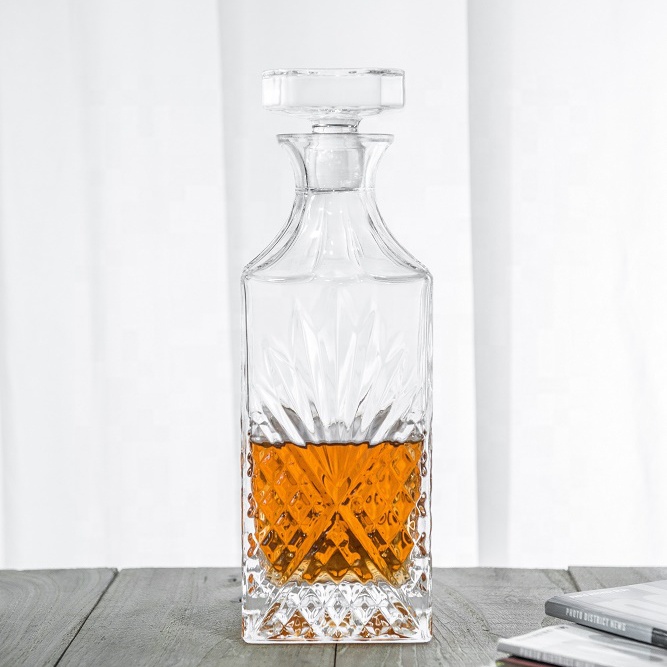The Finest Martini Glasses, In response to Specialists
With reference to Martini glassware, Al Sotack reaches for a coupe. The proprietor of Brooklyn’s Jupiter Disco prefers the aesthetics of the coupe’s timeless, rounded design and the best way during which the glass feels in hand, considerably when crammed to the close to brim with gin and vermouth. “If the acute, modernist strains of the V-shaped [Martini glass] is your subject, you do you, nevertheless it’s not mine,” he says.
At residence, Sotack drinks Martinis in an assortment of conventional cocktail glasses. At Jupiter Disco, bartenders pour stirred drinks, together with Martinis, into common five-ounce coupes. Nonetheless Sotack, a scholar of cocktail historic earlier and considerably of a glassware diplomat, permits for context.
“Correct proper right here’s the problem. The concept a Martini glass and a coupe are these two diametrically opposed choices for drinks is absurd,” he says. “They’re each coupes and each have a historic earlier of serving Champagne and blended drinks.”
The coupe emerged all through the 1830s as a hottest vessel for Champagne, only a few a couple of years ahead of Jerry Thomas revealed his 1862 Bartenders Knowledge. Correctly known as thought-about one in every of many world’s earliest cocktail manuals, Thomas’s e information instructed readers to emphasize drinks like The Gin Cocktail and Martinez into coupes.
The Martini—a doable descendent of the Martinez, itself a Manhattan variation—acquired proper right here a couple of years later nonetheless, talked about in newspaper articles as early as 1886 and Harry Johnson’s Bartender’s Info in 1888. Whereas the US bar enterprise was waylaid by Prohibition, the important V-shaped Martini glass as everybody is aware of it debuted in Paris on the 1925 Worldwide Exhibition of Trendy Ornamental and Industrial Arts. Its triangular type was meant to exemplify Artwork work Deco use of geometric types.
Nonetheless whereas Artwork work Deco vogue mild all through the lead as lots as World Warfare II, the dramatic V-shaped coupe it left behind solely gained recognition, merging with midcentury fashionable design aesthetics, and turning into synonymous with the Martini all through the Nineteen Forties. James Bond acquired proper right here alongside all through the ’60s and cemented its primacy alongside alongside together with his major Vesper Martini, “shaken, not stirred” then strained correct proper right into a V-shaped glass.
Liquor.com / Laura Sant
The V-shaped Martini Glass: Worst Glass Ever?
Historic earlier is one subject, nonetheless professionally slinging Martinis is completely one completely different. Only a few of Sotack’s associates have far lots a lot much less charitable views of the Martini glass.
“The Martini glass was designed by a sadist,” says Jacob Tshetter, a supervisor at Tuthilltown Spirits Distillery in upstate New York. “The one place they belong is all through the trash.”
Shaun Traxler, a bar promoting advertising marketing consultant in Fayetteville, Arkansas, concurs. “The important Martini glass may be primarily probably the most poorly thought-out glass of all-fucking-time. Even these glasses the place you principally drink out of a hen’s anus are elevated than these impossible-to-carry-without-spilling devices of crap.”
Really, top-heavy, V-shaped glasses are weak to spillage in transport from the bar to your mouth. And easily nowadays, on account of TikTok, a sure stress of novice Martini drinker has begun to complain when their Martini glasses—typically eight- to 10-ounces—aren’t perilously full. “Folks anticipate a full glass,” says Josue Castillo at Boston’s Subsequent Door Speakeasy & Uncooked Bar.
Ricky Dolinksy of New York’s Paper Planes bemoans the Martini glass’ carry out as a kitschy meals vessel. “Too many consuming areas have bastardized the V-shaped Martini glass to carry all the points nonetheless a Martini. Fried shrimp, ceviche, salads, pudding,” he says.
For a sure interval of bartenders, too, the V-shaped glass has cultural baggage. “It’s a dated glass type,” says Charlie Reyes, lead bartender at The Garret West. When Reyes sees that V type he has flashbacks to his days shaking neon inexperienced Appletinis.
“Only a few of us veteran bartenders recall a time when all cocktails had been known as ‘Martinis,’ and virtually all of these ‘Martinis’ had been served in ugly, unruly, tall, and poorly designed triangular glasses,” says Brandon Ristaino, co-founder and beverage director at Good Lion Hospitality. “Most of those glasses had been far too large to take pleasure in a cocktail up ahead of it was rendered too heat for consumption.”
Liquor.com / Laura Sant
Staff Nick & Nora
Conversely, Ristaino prefers the Nick & Nora glass, which is generally 5 ounces in quantity and sports activities actions actions a nearly spill-proof design. “Hanging a stability between elegant and sturdy, this quintessential glass of the nouveau cocktail interval is my standby for Martinis,” he says.
The Nick & Nora type was rescued from obscurity by Dale DeGroff all through the late Nineteen Eighties at The Rainbow Room. The legendary barman wished glassware distinct from the interval’s ’Tini craze and turned to the catalog of old-school glassware producer, Minners Designs. He requested for glasses akin to the small coupes confirmed all through the 1934 movie, The Skinny Manwhose characters Nick and Nora Charles drink a substantial variety of Martinis whereas fixing a homicide thriller. Minners had merely the glass, and DeGroff’s nickname for it, the Nick & Nora, caught. (Steelite Worldwide formally renamed the glass when it bought the design from Minners.)
Earlier its spill resistance, lead bartender Harrison Snow of New York Metropolis’s Lullaby maintains that the Nick & Nora design retains Martinis colder for longer. “The portion of the cocktail that’s uncovered to air is means smaller than with a standard Martini glass,” says Snow. “I think about the smaller floor home furthermore offers for an extra good fragrant expertise.”
Singapore-based kes-sho glassware will shortly launch the Dick & Dora glass, a modified Nick & Nora with a flared rim. It’s in the intervening time on proprietor Jay Grey’s want itemizing for his Sago Home, Low Tide, Ghostwriter, and Underdog Inn in Singapore. “A flared rim [makes] for an extra pure interplay between the glass and the consumer, [as it] follows the angle at which our lips make contact with the rim of the glass,” says kes-sho designer Nicholas Braun.
:max_bytes(150000):strip_icc()/nick-and-nora-martini-720x720-primary-cffc8e0935714d9785d27d48ac44f6da.jpg)
Beau du Bois, the vice chairman of spirits at La Jolla’s Marisi, has “googly eyes” for four-ounce Rémy Savage NUDE Pony glasses. “Delicate all through the hand, superbly skinny and with a tall stem, the amount is solely over 4 ounces, which is sweet for the standard three-ounce recipe,” says du Bois.
Pete Siewruk sources 5.5-ounce Libbey Nick & Noras for Sparrow in Fort Lauderdale, a rooftop bar with a Rat Pack-meets-Palm-Seaside-modern inside. “There’s merely one issue so major and classy about it,” says Siewruk. “The Nick & Nora appears tiny, nevertheless it’s an correct Martini glass. I’ll actually defend it to my dying breath.” Siewruk may even be acknowledged to drop a frozen olive into the underside of the glass to maintain his Soiled Martinis extra-cold.
Reyes may even be a fan of the Nick & Nora for its aesthetics and plunge depth, supreme for olives and correct twists, he says. Nonetheless the diminutive glass doesn’t work in each bar setting. “We use coupes at The Garret,” says Reyes. “To goal to maintain stock of Nick & Noras with the quantity of quantity we do, and the quantity of breakage that’s a outcomes of that quantity, it’s merely not cost- setting pleasant.”
Liquor.com / Laura Sant
Let’s Hear It for the Coupe
Marshall Minaya, beverage director of Madame George and Valerie in New York Metropolis, desires he might uncover a six-ounce Nick & Nora. “With reference to serving my Martini, it’s all relating to the washline,” says Minaya, referring to the extent of liquid all through the glass, ideally 10–15% beneath the lip. “You gotta have a snug wash line for the server to run it to the desk, the bartender to maneuver it from efficiently to buyer, and the shopper to take it from bar to mouth. For that motive, I select to get a glass that has an extra ounce in the marketplace to depart some contour to the glass and a stunning wash line on a splendidly diluted cocktail.”
For now, which implies Minaya shares his bars with six-ounce coupes.
Eric Maldonado is a “coupe boi” by way of and by way of, he says. The best bartender of the Elysian Cafe in Hoboken, New Jersey, extols the coupe’s many virtues: they resist chipping, stack merely in storage or the freezer (in case you’ve ever seen a Champagne tower, you acknowledge), have an unbelievable washline, and are versatile ample to service numerous cocktails (amongst them Martinis, Espresso Martinis, and sours). Oh, they usually’re not unimaginable to drink out of.
Dolinsky of Paper Planes makes use of five-ounce coupes, which he say, “hold merely ample liquid to fill close to the rim [and are] merely quick ample to ship to the buyer with out spilling.” Nonetheless additional essential than its practicality, he feels that the coupe is a crucial companion to the Martini’s historic earlier and character. “Due to the Martini’s simplicity, the glass holding our favourite drink is solely as essential symbolically as a result of it is aesthetically.”
Liquor.com / Laura Sant
The Oddball Glass
Not everybody shares Dolinsky’s sense of obligation. Rylie Hightower, proprietor of The Lumbar in Birmingham, Alabama, pours her triple-brined Filthy Martini correct proper right into a seven-ounce Belgian beer glass.
“They’re deep ample to carry an olive skewer that sits contained inside the glass barely than all by means of the very best,” she explains, noting her group must descend stairs with the drink, which initially induced the olives to roll off the very best of the glass. “Plus, glasses supposed for beer are typically thicker, so these break comparatively reasonably lots lots a lot much less usually than our cocktail coupes.”
Making a Case for the Martini Glass
Irrespective of its fame and slosh-ability, the Martini glass nonetheless has an excessive amount of bartender devotees. At Refuge in Houston, Bobby Huegel serves his Bobby’s Martini in a deep V. “I’ve regularly hottest Martinis in V-shaped glasses,” he says. “[Bars] acquired off that progress, nonetheless we actually embraced it and wished to see [the V] come as soon as extra.”
Jon Howard, former bar supervisor for Martini-focused The Vesper Membership, loves the steep silhouette of the John Jenkins & Sons Atlantic Fundamental glass for Martinis garnished with an olive or pickled onion. Colin Berger of San Diego’s Uncommon Society shares 5.5-ounce Spiegelau Martini glasses with a faceted base.
“I would love my Martini glass to be full—the 5.5-ounce could also be only a bit more durable to stroll to the desk, nonetheless it’s regularly a full glass,” says Berger.
Will Wyatt, too, opts for five-ounce Martini glasses at his Mister Paradise in Manhattan’s East Village. “I like small V-shaped glasses, and am nice keen on the small glass with a sidecar-on- ice presentation, which we’re utilizing for the Prime Martini.”
Away from striving for petite, Chris Morales favors the V-shaped Martini glass for his program at Stefani Prime in Lincolnwood, Illinois. “When your friends are spending $175 for a ribeye chop, the bodily dimension of the V-shaped glass retains that larger-than-life mentality in play,” he says.
For Agostino Perrone, the V-shaped Martini glass is the Martini glass. Principal bartender at London’s The Connaught Bar, world-famous for its Martini service, Perrone concedes that the glass was overused all through the Nineteen Eighties and ’90s, and that the cocktail renaissance of the last word 20 years reunited bartenders with quite a few glass shapes, together with the Nick & Nora and coupe.
“Nonetheless let me ask you one issue—have you ever ever ever ever seen James Bond ingesting from a cocktail coupe?” says Perrone. “No. On account of it’s a life-style second. It’s not merely liquid by itself, and, considerably all through the setting on the Connaught Bar, there’s a means of glamor. That’s what influences the choice making behind what sort of glassware we use.”




:max_bytes(150000):strip_icc()/nick-and-nora-martini-720x720-primary-cffc8e0935714d9785d27d48ac44f6da.jpg?w=1200&resize=1200,0&ssl=1)
:max_bytes(150000):strip_icc()/__opt__aboutcom__coeus__resources__content_migration__liquor__2019__07__08153757__Do-Wine-Purifying-Products-Actually-Work-720x720-article-a2d306c9e69548aaa00451e55b6a96b8.jpg?w=1200&resize=1200,0&ssl=1)